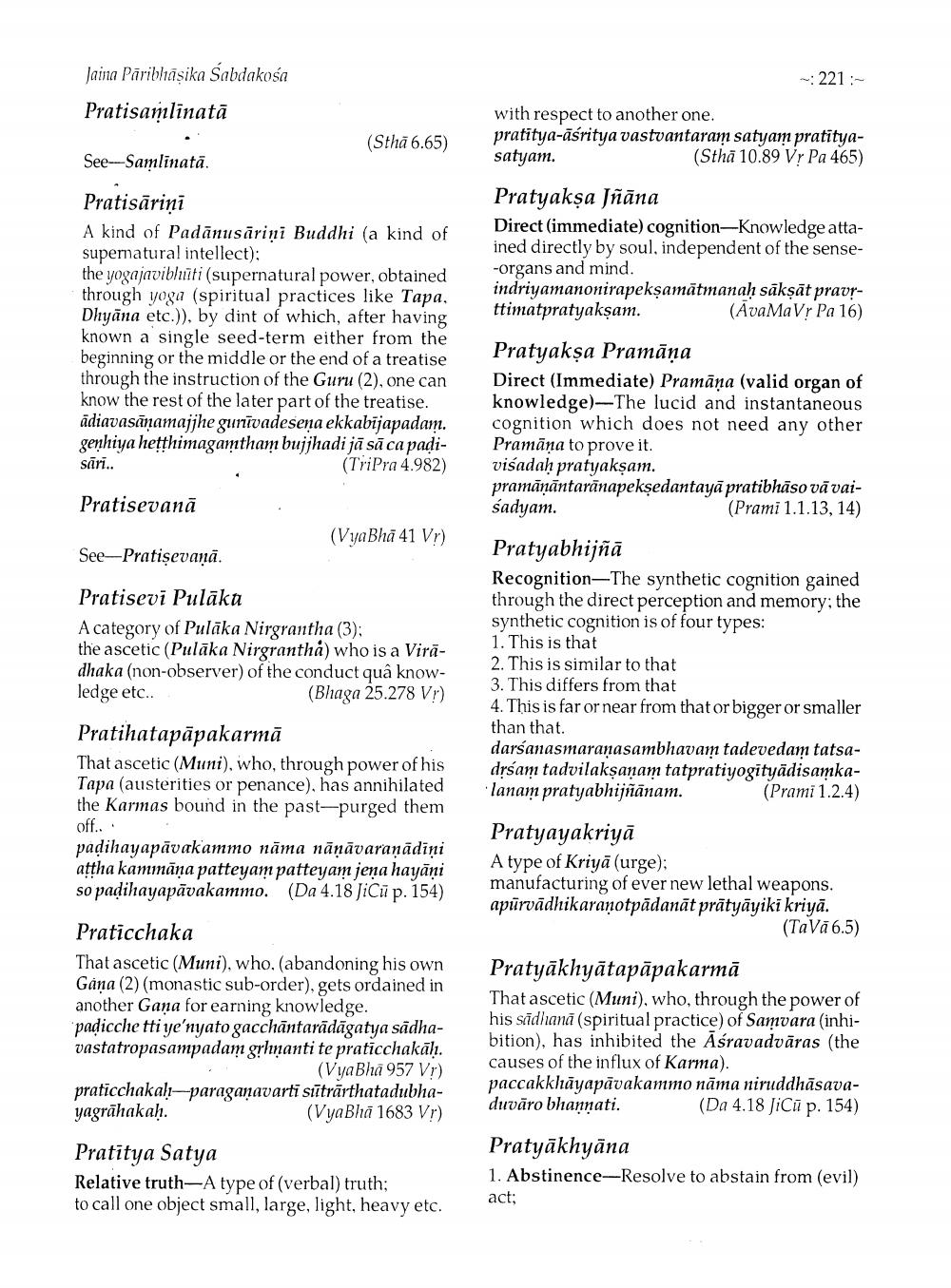________________
221 :
Jaina Pāribliasika Sabdakosa Pratisamlinatā
(Sthā 6.65)
with respect to another one. pratitya-āsritya vastvantaram satyam pratityasatyam.
(Sthā 10.89 V? Pa 465)
See---Samlinata.
Pratyakşa Jñāna Direct (immediate) cognition-Knowledge attained directly by soul, independent of the sense-organs and mind. indriyamanonirapekşamātmanaḥ sākṣāt pravrttimatpratyakşam.
(Ava Ma Vr Pa 16)
Pratisārini A kind of Padānusārini Buddhi (a kind of supernatural intellect); the yogajavibluiti (supernatural power, obtained through yoga (spiritual practices like Tapa, Dhyāna etc.)), by dint of which, after having known a single seed-term either from the beginning or the middle or the end of a treatise through the instruction of the Guru (2), one can know the rest of the later part of the treatise. ādiavasānamajjhe gunīvadesena ekkabijapadam. geņhiya hetthimagamtham bujjhadijā sāca padisāri..
(TriPra 4.982)
Pratyakşa Pramāņa Direct (Immediate) Pramāņa (valid organ of knowledge)-The lucid and instantaneous cognition which does not need any other Pramāna to prove it. visadah pratyakşam. pramāṇāntarānapekşedantayā pratibhāso vā vaisadyam.
(Prami 1.1.13, 14)
Pratisevanā
(VyaBhā 41 Vr) See—Pratişevaņā. Pratisevi Pulāka A category of Pulāka Nirgrantha (3); the ascetic (Pulāka Nirgrantha) who is a Virādhaka (non-observer) of the conduct quâ knowledge etc..
(Bhaga 25.278 VI)
Pratyabhijñā Recognition—The synthetic cognition gained through the direct perception and memory, the synthetic cognition is of four types: 1. This is that 2. This is similar to that 3. This differs from that 4. This is far or near from that or bigger or smaller than that darsanasmaranasambhavam tadevedam tatsadrsam tadvilaksanam tatpratiyogityädisamkalanam pratyabhijñānam. (Prami 1.2.4)
Pratihatapāpakarmā That ascetic (Muni), who, through power of his Tapa (austerities or penance), has annihilated the Karmas bound in the past-purged them off.. padihayapāvakammo nāma nāṇāvaraņādiņi attha kammāņa patteyam patteyam jena hayāņi so padihayapāvakammo. (Da 4.18 JiCū p. 154)
Pratyayakriya A type of Kriyā (urge); manufacturing of ever new lethal weapons. apūrvādhikaraņotpādanāt prātyāyiki kriyā.
(TaVā6.5)
Praticchaka That ascetic (Muni), who, (abandoning his own Gana (2) (monastic sub-order), gets ordained in another Gana for earning knowledge. padicchetti ye'nyato gacchāntarādāgatya sādhavastatropasampadam grhnanti te praticchakāł.
(Vya Bha 957 Vr) praticchakah--paraganavarti sutrarthatadubhayagrāhakah.
(Vya Bhā 1683 Vr)
Pratyākhyātapāpakarmā That ascetic (Muni), who, through the power of his sãīdanā (spiritual practice) of Samvara (inhibition), has inhibited the Aśravadvāras (the causes of the influx of Karma). paccak klāyapāvakammo nāma niruddhāsavaduvāro bhannati. (Da 4.18 JiCū p. 154)
Pratītya Satya Relative truth-A type of (verbal) truth; to call one object small, large, light, heavy etc.
Pratyākhyāna 1. Abstinence-Resolve to abstain from (evil) act;




